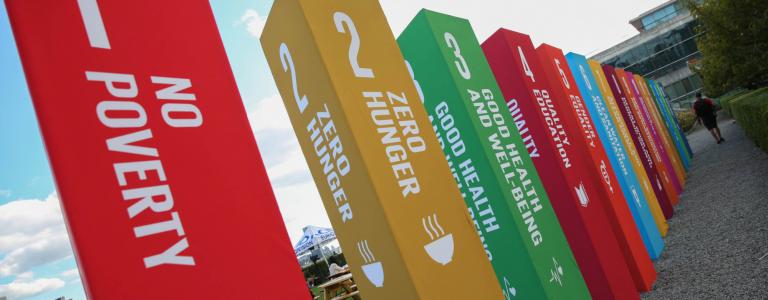Global Launch of the 2022 Progressing National SDGs Implementation Report
The Progressing National SDGs Implementation report series provides independent analyses of how UN Member States share progress at the annual High-level Political Forum on Sustainable Development (HLPF). Supported by a global coalition of civil society organizations and prepared by Action for Sustainable Development, the 2022 report examines trends in the uneven COVID-19 pandemic recovery and shifting global economic woes as the Global Goals reach their halfway mark.
Join us for the launch of the seventh edition of ‘Progressing National SDGs Implementation’. This report aims to provide useful insights and assessment of the Voluntary National Reviews (VNRs) presented at the HLPF in 2022. The analysis also offers recommendations to inform discussions on SDG delivery, to help guide improved reporting and implementation at the mid-point of the 2030 Agenda.
44 countries prepared a VNR in 2022. As the world began to emerge from the COVID-19 pandemic, there were some signs of stronger commitments to SDG reporting and implementation; there was also a broader number of civil society parallel reports prepared. The pledge to Leave No One Behind and the aim to connect delivery with the Paris Agreement were featured in a high number of reports. However, there was limited discussion of the challenges for civic freedoms and a reduction in references to local implementation.
The launch event will feature key findings from the report and hear from experts and government representatives on how they aim to build on the lessons learned to ensure effective follow up and review of the SDGs.
The report was compiled by Action for Sustainable Development, ANND, BOND, Cepei, Cooperation Canada, CPDE, Forus, Global Focus, IISD, Save The Children, Sightsavers, and World Vision International.
A few key findings
‘Whole of society’ approach: The review of 2022 VNR reports included a similar level of references to the inclusion of non-state actors in formal SDG governance as the 2021 reviews. However, there seems to be a shift in participation towards more technical working groups and less high-level interaction.
Leave No One Behind: The VNR reports in 2022 included many references to the principle of Leaving No One Behind. However, challenges remain in terms of data availability, the level of detail and quality of information provided, and on the incorporation of the LNOB principle into national plans.
Civic Space: There are increasing challenges for civic freedoms. However, the VNR reports continue to be largely silent on shrinking civic space, including in relation to the ongoing attacks against human rights defenders, journalists, and environmentalists in many countries.
Localization: The ambition to localize SDG implementation has been widely discussed. However, the 2022 VNRs contained fewer examples of localization, and less information on the formulation of Voluntary Local Reviews than in 2021.
Transformative principles of the 2030 Agenda: There has been some improvement in the reports’ inclusion of information on key principles, mainly on leaving no one behind and human rights. However, reporting on universality, planetary boundaries and intergenerational responsibility is still uneven.
Upcoming events
Building Bridges: The State of Nature-Based Investments
Join us for a panel at the Building Bridges conference in Geneva, Switzerland, to discuss the state-of-play of nature-based investments and the potential opportunities they present.
Through Her Lens: Women leading change in sustainable agriculture and market inclusion
Despite the critical role that women play in agricultural production, they still do not have equal access to global agricultural supply chains on terms that benefit them.
A Municipal Perspective on the Value of Natural Infrastructure
This webinar will showcase examples the cost-effectiveness of natural infrastructure from a municipal perspective. Focusing on what municipalities need—what evidence and numbers they rely on, and what tools and planning processes are required to ensure that natural infrastructure is assessed alongside traditional infrastructure for cost-effectiveness.
